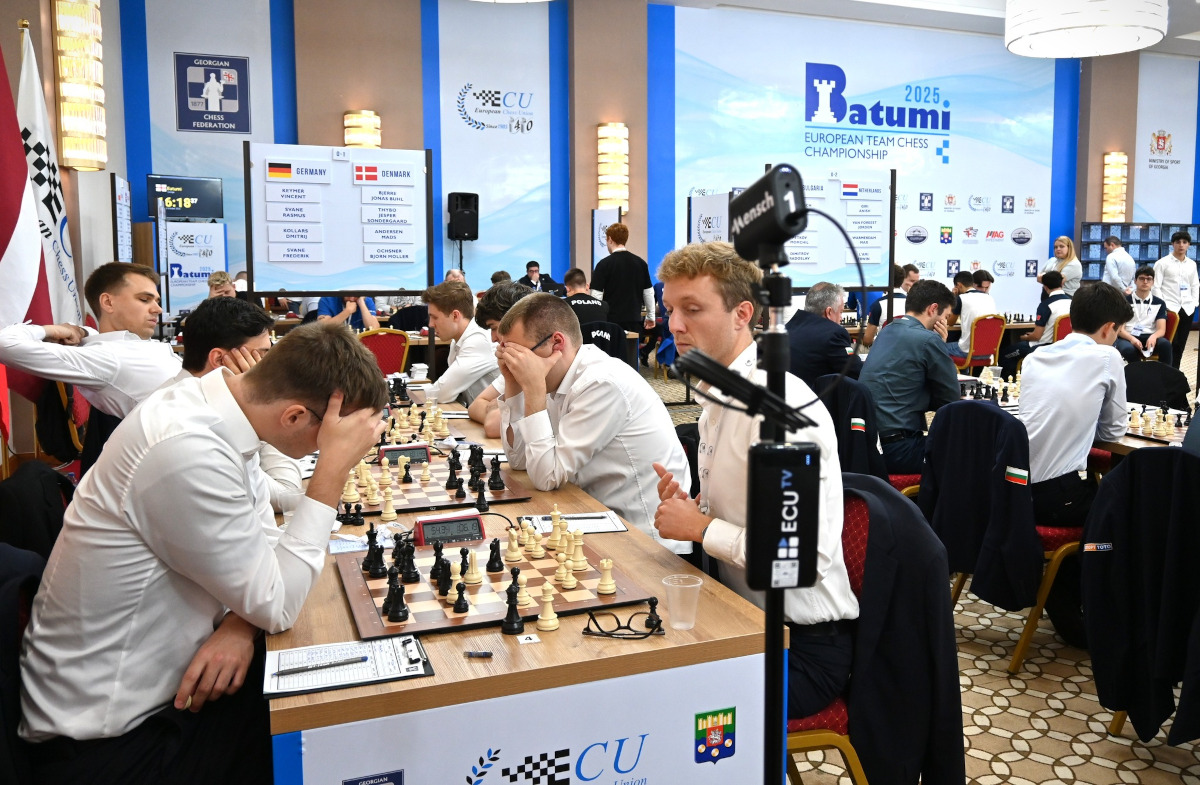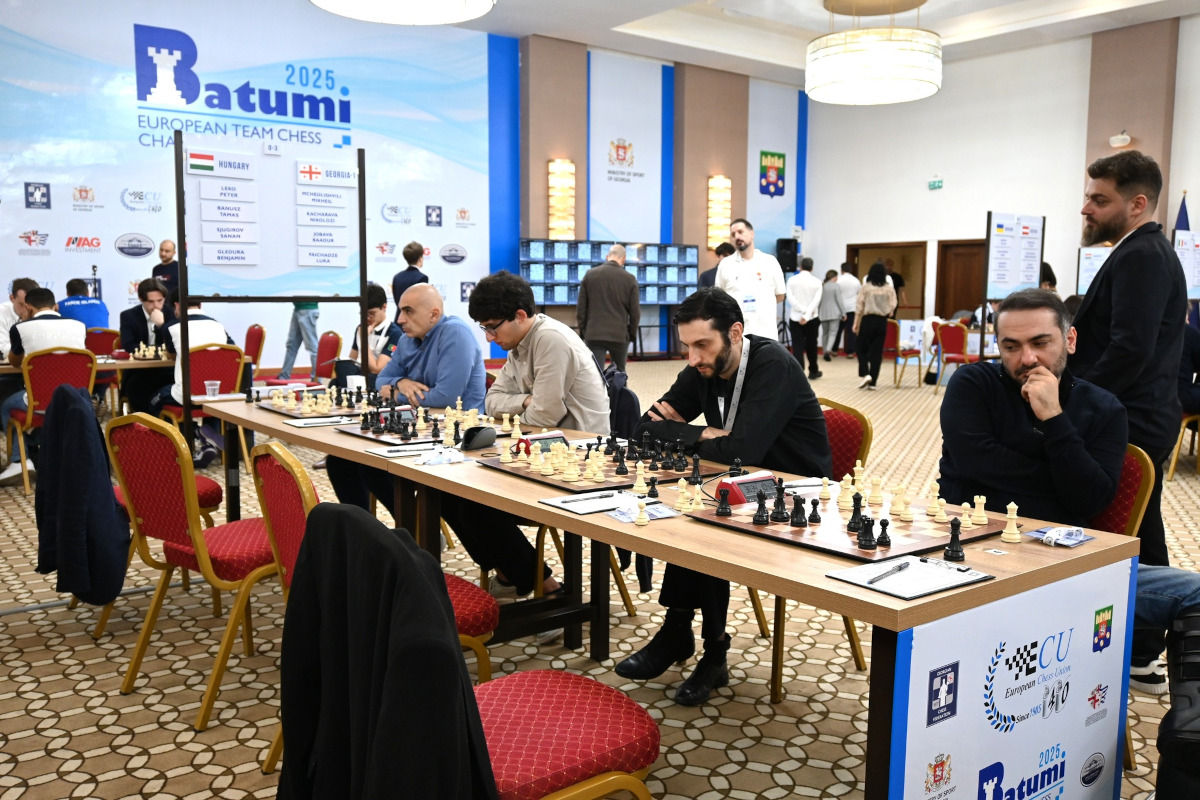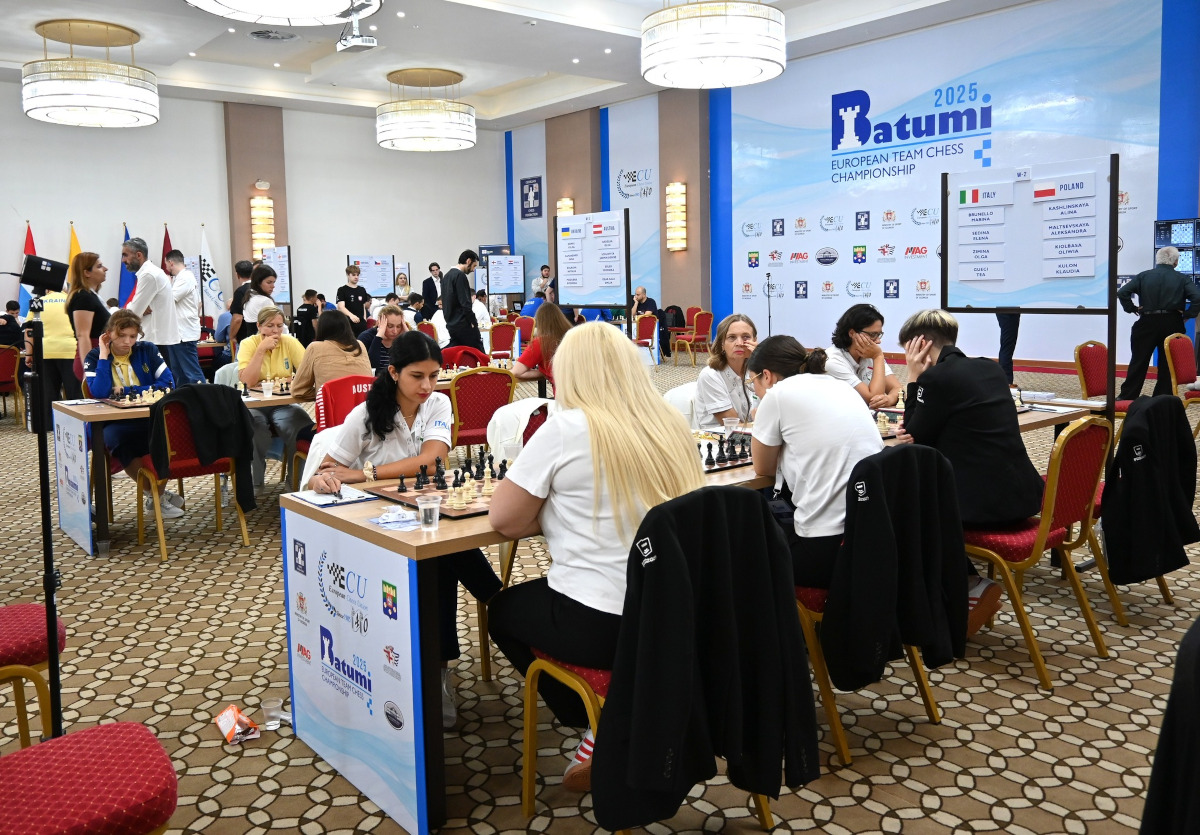Open: Germany and Hungary lose in first round
The European Team Chess Championship opened in Batumi with an eventful first round that saw both expected results and early surprises. While many of the leading nations began solidly, several underdogs produced notable upsets that immediately set a competitive tone for the nine-round event.
The most striking result of the day came on the top table, where Denmark defeated top seeds Germany by 2½-1½. Mads Andersen’s victory over Dmitrij Kollars was enough to tip the balance after three draws on the remaining boards.
Kollars, playing Black, miscalculated early in the middlegame, allowing Andersen to win a piece outright. After 21.Nxb5, played after 12 minutes, there followed 21…Nxd3 22.Rxd3 and the great-looking 22…Qa5
The German could not capture on a5 due to the back rank tactic 23…Rc1+. Forced to continue with 23.Qd1, Kollars saw his knight fall to 23…Qxb5, after which Andersen converted the advantage with calm precision in 39 moves.
On top board, Vincent Keymer pressed hard against Jonas Buhl Bjerre but could not convert a pawn-up minor-piece ending.
The Danish grandmaster showed strong defensive technique, and after a long struggle the players agreed to a draw.

Germany v. Denmark
There was another upset on board three, where Hungary lost narrowly to Georgia. Baadur Jobava, the mercurial Georgian grandmaster, produced the decisive win to give the hosts an excellent start against one of the title contenders.
Further down the order, Switzerland held eighth seeds Spain to a 2-2 draw, as all four games ended peacefully after long, well-contested battles. Among the other matches, the Netherlands, Azerbaijan and England all made winning starts, though some of their encounters were closer than expected.

The Georgian team, with Baadur Jobava on board three, thinking while all the Hungarian players have left their seats
Lortkipanidze 0-1 Gurel
Analysis by GM Karsten Müller
Standings after round 1
| 1 | Netherlands | 1 | 1 | 0 | 0 | 2 | 0 | |
| Croatia | 1 | 1 | 0 | 0 | 2 | 0 | ||
| Austria | 1 | 1 | 0 | 0 | 2 | 0 | ||
| Turkiye | 1 | 1 | 0 | 0 | 2 | 0 | ||
| Israel | 1 | 1 | 0 | 0 | 2 | 0 | ||
| Italy | 1 | 1 | 0 | 0 | 2 | 0 | ||
| 7 | Azerbaijan | 1 | 1 | 0 | 0 | 2 | 0 | |
| Greece | 1 | 1 | 0 | 0 | 2 | 0 | ||
| Slovenia | 1 | 1 | 0 | 0 | 2 | 0 | ||
| Czech Republic | 1 | 1 | 0 | 0 | 2 | 0 | ||
| Romania | 1 | 1 | 0 | 0 | 2 | 0 | ||
| 12 | England | 1 | 1 | 0 | 0 | 2 | 0 | |
| Armenia | 1 | 1 | 0 | 0 | 2 | 0 | ||
| Serbia | 1 | 1 | 0 | 0 | 2 | 0 | ||
| Ukraine | 1 | 1 | 0 | 0 | 2 | 0 |
All games
Women’s: Austria draw Ukraine, Slovakia upset Spain
The favourites fared better in the women’s competition. Hosts Georgia and second-seeded Poland both scored convincing victories.
On board three, however, Austria achieved an impressive 2–2 draw against third-seeded Ukraine. Emilia Deak-Sala’s win over Boshena Piddubna proved crucial. The Austrian capitalised on her opponent’s errors in a sharp middlegame and finished with a clean attacking sequence – 39.Rxg6 was followed by resignation
After 39…fxg6 there is 40.Re7, with mate on h7 inevitable.
An even bigger surprise occurred on board seven, where Slovakia edged out Spain by 2½-1½. Although Spain’s top board, Iranian-born Sara Khadem, defeated Eva Repkova, the Slovak team turned the match around thanks to victories by Viktoria Nadzamova and Lucia Sevcikova on the lower boards.

Italy v. Poland and Ukraine v. Austria in the women’s competition
